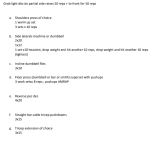TomJ
"Elite" 😏
- Joined
- Sep 3, 2021
- Messages
- 4,314
- Reaction score
- 11,176
- Points
- 288
We are saying the same thing here. Its all based on diet and drugs too. If you can take something to failure, and it is recovered within two days, his whole thing is frequency. You dial your intensity back to guarantee frequency. Thats how he thinks.
IMO and experience
if your goal is frequency, then youre better off scaling back your volume to a recoverable level, rather than sacrificing intensity.
if youre training with 5 working sets at 2 RIR, assuming the last 5 reps are those that stimulate the most hypertrophy, that gives you 15 reps of adaptation stimulation.
you could get the same theoretical hypertrophic response from 3 sets to failure, with far less other fatigue factors that come from unnecessary volume.
so in the RIR model, youre literally doing more, to achieve the same or less.



















